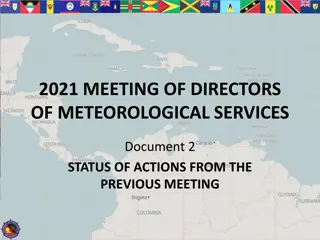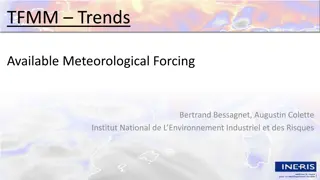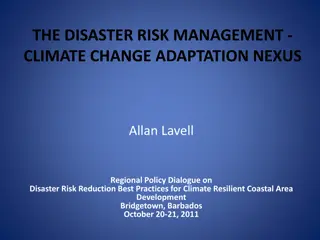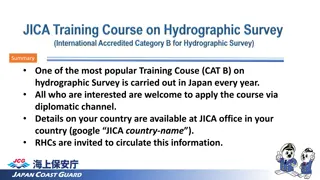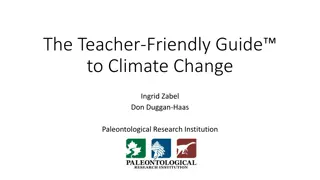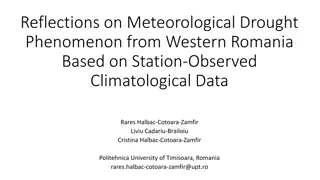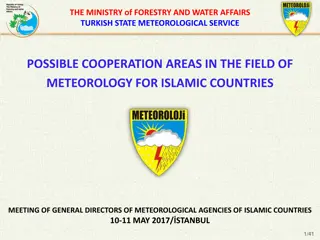Climate Change Analysis by Japan Meteorological Agency
Tokyo Climate Center, under Japan Meteorological Agency, uses climate models to assess global warming effects. The observed trends in Tokyo show a significant rise in temperature but no discernible trend in precipitation. Future projections indicate a substantial increase in temperature with uncertain changes in precipitation. Detailed analysis and uncertainty reliability under different scenarios provide insights into potential future climate changes in the region.
Download Presentation

Please find below an Image/Link to download the presentation.
The content on the website is provided AS IS for your information and personal use only. It may not be sold, licensed, or shared on other websites without obtaining consent from the author.If you encounter any issues during the download, it is possible that the publisher has removed the file from their server.
You are allowed to download the files provided on this website for personal or commercial use, subject to the condition that they are used lawfully. All files are the property of their respective owners.
The content on the website is provided AS IS for your information and personal use only. It may not be sold, licensed, or shared on other websites without obtaining consent from the author.
E N D
Presentation Transcript
Exercise Template WAKAMATSU Shunya Japan Meteorological Agency 1
Template: Introduction Sample Tokyo Climate Center / Japan Meteorological Agency JMA assess the effects of global warming on the climate with the Global Warming Projection with climate models developed by the JMA's Meteorological Research Institute (MRI). JMA monitors long-term changes in global average surface temperature anomalies for the purpose of monitoring global warming. Climatology in Japan Early summer is the rainy season, known as the Baiu, caused by a stationary Baiu front. In Summer, the North Pacific High extends northwestward around Japan, bringing hot and sunny conditions. Monthly precipitation amounts are large in autumn due to the active autumnal rain front and tropical cyclones. Recent extreme events The Heavy Rain Event of July 2018 from western Japan to the Tokai region and the Subsequent Heatwave from Mid-July Onward Record-heavy rain In mid-August 2021 from western to eastern Japan Record-heavy rain and record low sunshine durations from eastern to northeastern Japan Japan s four seasons 2
Template: Observed Trend Sample The annual mean surface temperature in Tokyo has risen at a rate of 2.56 C per century (statistically significant at a confidence level of 99%). There has been no discernible trend in the annual mean precipitation in Tokyo. Annual Mean Temperature (2.6 C/100yr) Annual Total Precipitation (no trend) (mm) ( C) 18 2400 2200 17 2000 16 1800 15 1600 1400 14 1200 13 1000 12 800 1876 1882 1888 1894 1900 1906 1912 1918 1924 1930 1936 1942 1948 1954 1960 1966 1972 1978 1984 1990 1996 2002 2008 2014 2020 1876 1882 1888 1894 1900 1906 1912 1918 1924 1930 1936 1942 1948 1954 1960 1966 1972 1978 1984 1990 1996 2002 2008 2014 2020 Years Years Data Best fit Data 3
Template: Future Change Sample The projected changes in monthly mean surface temperatures in Tokyo in 2080-2099 relative to the 1995-2014 are in the range of +3.5 C (Dec.) to +5.0 C (Sep.). In August, the future value is 31.2 C (Aug.). The projected changes in total precipitation in Tokyo in 2080-2099 relative to the 1995-2014 have no significant tendency. (mm) ( C) Monthly Total Precipitation Changes Monthly Mean Temperature Changes 300 7 250 6 200 5 150 4 100 3 50 2 0 1 1 2 3 4 5 6 7 8 9 10 11 12 -50 0 -100 1 2 3 4 5 6 7 8 9 10 11 12 -1 -150 -200 -2 Months Months 4
Template: Uncertainty (Reliability) Sample Under RCP8.5/SSP5-8.5, it is likely that most land areas will experience further warming of at least 4 C compared to a 1995 2014 baseline by the end of the 21st century, and in some areas significantly more. <AR6 WG1 TS.4.3.1> Considering emission scenario difference and the country location in the IPCC projection map, the projection with MRI-AGCM is similar with those in IPCC. SSP8-8.5 Monthly Mean Temperature Changes 7 6 Multi-model s annual projected change 5 4 3 2 1 0 1 2 3 4 5 6 7 8 9 10 11 12 -1 -2 The change from 1995 2014 to 2081 2100 in annual hottest daily maximum temperature, TXx. <AR6 WG1 Interactive Atlas> https://interactive-atlas.ipcc.ch/ 5
Template: Summary and Discussion Sample Findings The annual mean surface temperature in Tokyo has risen at a rate of 2.56 C per century. In August, the projected value in surface temperatures in Tokyo in 2080-2099 relative to the 1995-2014 is 31.2 C. Estimated impact on the society Risk of heat stroke would be increased. Actions to be needed I think Increasing people s awareness about "Heat Stroke Alert" https://www.wbgt.env.go.jp/en/#alert_map 6








